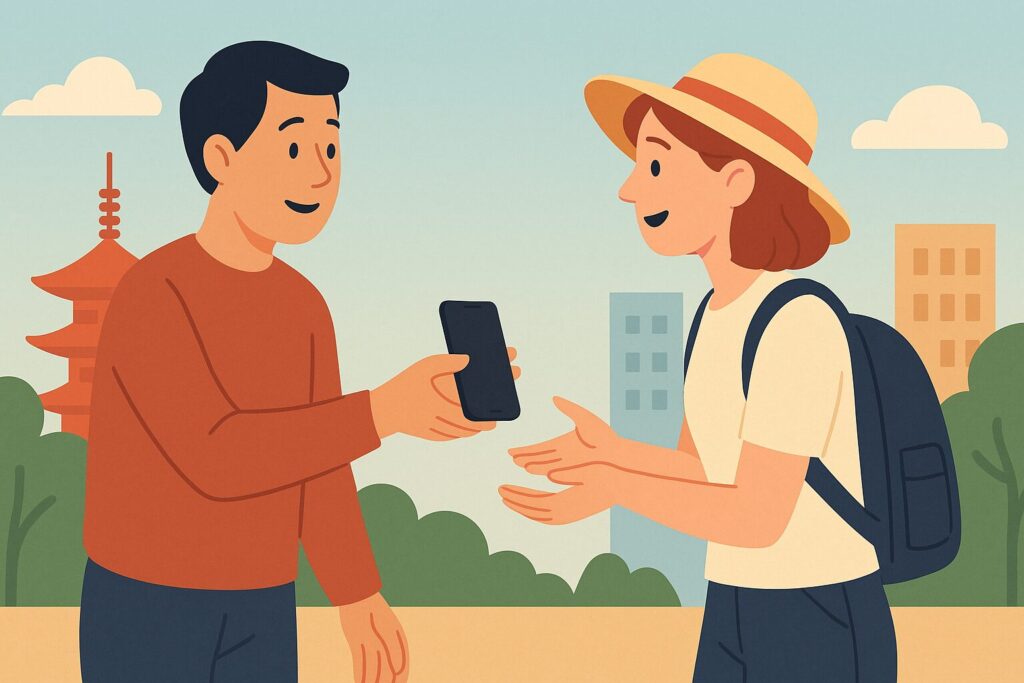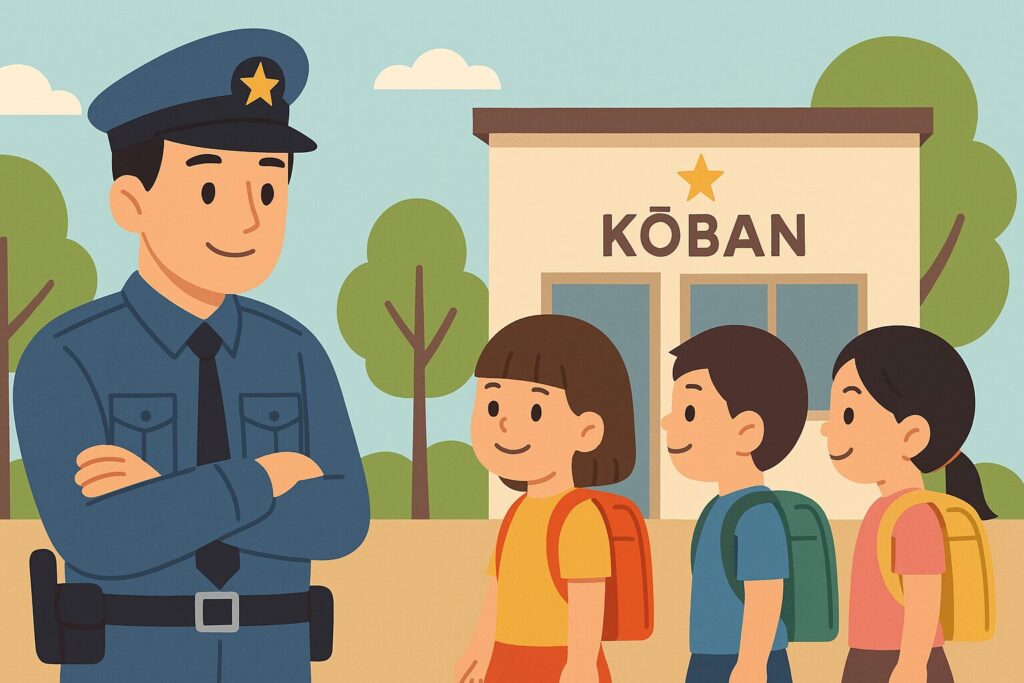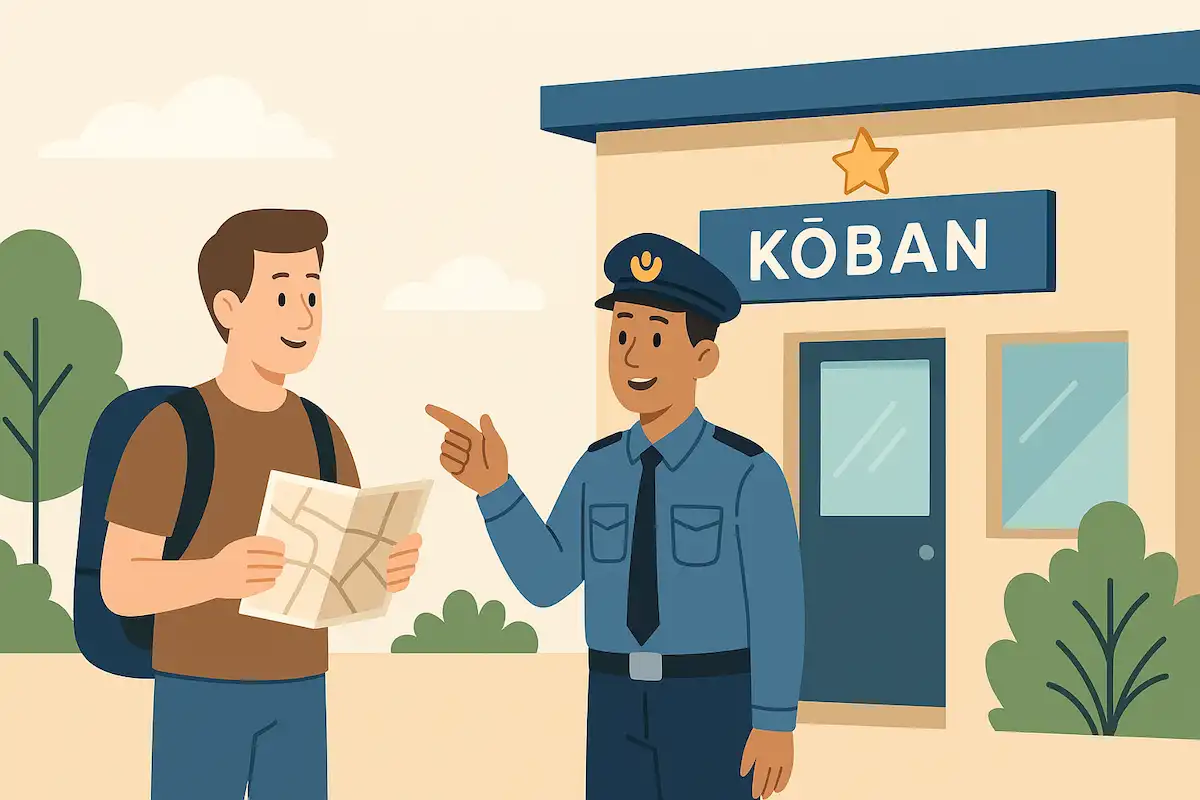日本の治安の良さを英語で説明・紹介するための基本情報と、英会話に役立つ表現をシンプルでわかりやすい英語で紹介します。
英会話ダイアローグ・概要・10の質問を通して、日本の治安の良さに関する英語表現を学びます。
英語
英会話ダイアローグを読む前に知っておくと良い前提知識と情報です。
- 日本の治安の特徴
- 日本は犯罪率が非常に低く、夜間でも一人歩きが比較的安全な国
- 特に銃犯罪や強盗事件など重大犯罪の発生が非常に少ない
- 交番
- 日本各地に設置されている小さな警察署
- 警察官が地域を巡回したり、道案内や落とし物の対応など地域住民や観光客を助ける役割を担っている
- 日本の安全性を支える文化的背景
- 日本社会には「他人に迷惑をかけない」「正直である」「ルールを守る」などの価値観が深く根付いている
- 外国人観光客にとっての日本の治安の魅力
- 日本の安全性は外国人観光客から高く評価されている
- 落とし物が戻ってくることに驚く観光客も多い
- 子どもたちが一人で登下校できる環境
- 日本では子どもたちが一人で学校へ通ったり、公共交通機関を利用することが一般的
- 地域や交番が安全を見守っているため、親も安心している
2人が日本の治安の良さについて話しています。
日本の安全性、交番の役割、落し物の返還率の高さ、厳しい銃規制、文化的背景などを話題にしています。
会話 / dialogue

Hey Key, I’ve noticed something really amazing since I came to Tokyo.

Really? What’s that, Mack?

It’s incredibly safe here. I’ve walked around Shinjuku at midnight and didn’t feel worried at all.

Yeah, that’s true. Japan is famous worldwide for its safety.

Why is Japan so safe compared to other countries?

Well, for starters, Japan has very strict gun control. Regular people aren’t allowed to own guns, so gun-related crimes are extremely rare.

Ah, so that’s why I never hear about shootings or violent crimes here.

Exactly. Another reason is cultural. Japanese society emphasizes respect, honesty, and following rules closely.

I noticed people patiently lining up at busy train stations, even during rush hour.

Right! By the way, have you ever heard of kōban?

Kōban? Those small police stations I see everywhere?

Yeah, that’s right! Kōban are local police boxes spread throughout neighborhoods and near train stations.

Interesting. But what exactly do they do?

Kōban help maintain public safety by having officers regularly patrol the area. You can also go there if you need help or information.

Like what kind of help?

Well, they help you if you’re lost, give directions, or handle reports of lost items. They even assist in minor emergencies or disputes.

Oh, now I understand why my friend went to a kōban when he lost his wallet. Surprisingly, it was returned safely!

Yeah, that happens often here because people trust the police and often hand over found items directly to the nearest kōban.

Wow, that’s impressive. Can tourists also use kōban?

Absolutely. Recently, many kōban officers have become able to speak basic English. They’re trained to assist foreign visitors, so it’s a great resource for travelers.

That’s good to know. It seems that kōban play a big role in Japan’s safety.

Exactly. It’s one of the main reasons why Japan stays safe and friendly, even in busy cities like Tokyo.

By the way, I saw young kids taking trains alone. Do kōban officers help keep an eye on children too?

Definitely. They sometimes stand outside schools or patrol neighborhoods during morning and afternoon to make sure kids get home safely.

That’s such a comforting thought. I’d love to visit a kōban and see it for myself.

You should! It would be an interesting cultural experience. Plus, you’ll understand even better why Japan is one of the safest places in the world.
概要 / Overview
「日本の治安の良さ」について、理解を深めるための「英語での概要」です。
日本の治安の良さ

Safe Streets, Day and Night
Japan is known as one of the safest countries in the world. In cities like Tokyo and Osaka, people feel safe walking alone, even at night. Crime rates are low, and serious crimes like robbery or gun violence are very rare.
Strong Rules and Respect
One reason for Japan’s safety is its culture. People learn to follow rules and respect others from a young age. In public places, people are quiet, polite, and wait in line. This helps keep order and peace in daily life.
Helpful Police Boxes: Kōban
You can find small police stations called kōban all over Japan. Police officers in kōban help with directions, lost items, and patrol the area. Many officers can speak basic English, so even tourists can ask for help.
Lost Items Often Come Back
In Japan, if you lose your wallet or phone, someone will likely return it to the police. This shows how honest people are. Many travelers are surprised and impressed by this.
Safe for Children and Tourists
Children often walk to school alone or take the train by themselves. Tourists also feel safe traveling around Japan. Even during disasters, people stay calm and help each other.
Conclusion
Japan’s safety comes from strict laws, respectful culture, and helpful community systems. It is one of the best places in the world to travel with peace of mind.
10の質問 / 10 questions
「日本の治安の良さ」について、理解を深めるための「英語での10の質問」です。
1: What does “safety in Japan” mean?
It means that Japan has very low crime rates, and people can live, travel, and go out without fear.
2: What makes Japan one of the safest countries?
Japan has strict laws, strong police presence, and a culture that respects rules and honesty.
3: What is a kōban in Japan?
A kōban is a small police box where officers help people with directions, lost items, and safety in the area.
4: Where can you find kōban?
Kōban are found near train stations, in neighborhoods, and in busy areas across Japan.
5: What should you do if you lose something in Japan?
You should go to the nearest kōban. Many people bring lost items there, and you may get your item back.
6: Is Japan safe for solo travelers?
Yes, Japan is very safe for solo travelers, including women. Many people travel alone without problems.
7: Are Japanese children safe when going to school?
Yes, many children walk to school or take trains by themselves. It is normal and safe in Japan.
8: What role does culture play in Japan’s safety?
Japanese people learn from childhood to be honest, kind, and respectful. This helps keep society peaceful.
9: Can tourists ask for help at a kōban?
Yes, tourists can ask for help. Some police officers speak basic English and are friendly to visitors.
10: How do people act during emergencies in Japan?
Even during disasters like earthquakes, people stay calm, line up, and help one another.

和訳付
会話 / dialogue

Hey Key, I’ve noticed something really amazing since I came to Tokyo.
ねえキー、東京に来てからすごく驚いたことがあるんだ。

Really? What’s that, Mack?
そうなの?何それ、マック?

It’s incredibly safe here. I’ve walked around Shinjuku at midnight and didn’t feel worried at all.
ここは本当に安全だよね。夜中に新宿を歩いても全然不安にならなかったんだ。

Yeah, that’s true. Japan is famous worldwide for its safety.
そうだね。日本は安全なことで世界的に有名だからね。

Why is Japan so safe compared to other countries?
他の国に比べて、どうして日本はこんなに安全なんだろう?

Well, for starters, Japan has very strict gun control. Regular people aren’t allowed to own guns, so gun-related crimes are extremely rare.
まず日本は銃の規制がとても厳しいんだ。一般人は銃を持つことが許されていないから、銃犯罪が極端に少ないんだよ。

Ah, so that’s why I never hear about shootings or violent crimes here.
ああ、だからここでは銃撃事件とか暴力犯罪のニュースを全然聞かないのか。

Exactly. Another reason is cultural. Japanese society emphasizes respect, honesty, and following rules closely.
その通り。それから、文化的な理由もあるんだ。日本社会は敬意や誠実さ、ルールをきちんと守ることを重視しているからね。

I noticed people patiently lining up at busy train stations, even during rush hour.
混んだ駅でもラッシュの時間帯でも、みんながちゃんと列を作って待ってるのを見たよ。

Right! By the way, have you ever heard of kōban?
そう!ところで、交番って聞いたことある?

Kōban? Those small police stations I see everywhere?
交番?あの街中にどこでも見かける小さな警察署のこと?

Yeah, that’s right! Kōban are local police boxes spread throughout neighborhoods and near train stations.
そう、その通り!交番は各地域や駅の近くにある小さな警察の拠点なんだ。

Interesting. But what exactly do they do?
面白そうだね。でも交番って実際には何をしているの?

Kōban help maintain public safety by having officers regularly patrol the area. You can also go there if you need help or information.
警察官が定期的に地域を巡回して治安を守っているよ。あと、困った時や何か知りたいことがある時に交番に行ってもいいんだよ。

Like what kind of help?
例えばどんな手助けをしてくれるの?

Well, they help you if you’re lost, give directions, or handle reports of lost items. They even assist in minor emergencies or disputes.
迷子になった時の道案内とか、落とし物の届出を受けたりするよ。ちょっとしたトラブルやもめ事の対応もしてくれるんだ。

Oh, now I understand why my friend went to a kōban when he lost his wallet. Surprisingly, it was returned safely!
なるほど、それで友達が財布をなくした時に交番に行ったんだ。驚いたけど、無事に戻ってきたんだよ!

Yeah, that happens often here because people trust the police and often hand over found items directly to the nearest kōban.
そういうことはよくあるんだ。みんな警察を信頼しているから、拾った物を近くの交番に直接届けるんだよ。

Wow, that’s impressive. Can tourists also use kōban?
それはすごいね。観光客も交番を利用できるの?

Absolutely. Recently, many kōban officers have become able to speak basic English. They’re trained to assist foreign visitors, so it’s a great resource for travelers.
もちろんだよ。最近は英語で基本的な対応ができる交番の警官も増えていて、外国人観光客への対応もしっかり訓練されているから、旅行者にとって便利な存在なんだ。

That’s good to know. It seems that kōban play a big role in Japan’s safety.
それは助かるね。交番って日本の治安の良さにとても重要な役割を果たしてるんだね。

Exactly. It’s one of the main reasons why Japan stays safe and friendly, even in busy cities like Tokyo.
まさにその通り。交番は、東京みたいな混雑した都会でも日本が安全でフレンドリーなままでいられる重要な理由の一つなんだよ。

By the way, I saw young kids taking trains alone. Do kōban officers help keep an eye on children too?
そういえば、小さな子どもたちが一人で電車に乗っているのを見たよ。交番の警官は子どもたちの見守りもしているのかな?

Definitely. They sometimes stand outside schools or patrol neighborhoods during morning and afternoon to make sure kids get home safely.
もちろんだよ。時々学校の外に立っていたり、朝や夕方の通学時間帯に地域を巡回して、子どもたちが安全に帰れるように見守っているんだ。

That’s such a comforting thought. I’d love to visit a kōban and see it for myself.
それを聞くとすごく安心するよ。一度自分でも交番に行ってみたいな。

You should! It would be an interesting cultural experience. Plus, you’ll understand even better why Japan is one of the safest places in the world.
ぜひ行ってみて!きっと面白い文化体験になるよ。それに、日本が世界で最も安全な場所の一つだってことをもっと深く理解できると思うよ。
概要 / Overview
日本の治安の良さ

Safe Streets, Day and Night
Japan is known as one of the safest countries in the world. In cities like Tokyo and Osaka, people feel safe walking alone, even at night. Crime rates are low, and serious crimes like robbery or gun violence are very rare.
昼も夜も安全な街
日本は世界で最も安全な国のひとつとして知られています。東京や大阪のような都市でも、人々は夜に一人で歩いても安心だと感じています。犯罪率は低く、強盗や銃による犯罪などの重大な事件はほとんどありません。
Strong Rules and Respect
One reason for Japan’s safety is its culture. People learn to follow rules and respect others from a young age. In public places, people are quiet, polite, and wait in line. This helps keep order and peace in daily life.
ルールと敬意を大切にする文化
日本の治安の良さの一因は文化にあります。人々は幼いころからルールを守ることや他人を尊重することを学びます。公共の場では静かに行動し、礼儀正しく列に並びます。これが日常生活の秩序と平和を保つ助けになっています。
Helpful Police Boxes: Kōban
You can find small police stations called kōban all over Japan. Police officers in kōban help with directions, lost items, and patrol the area. Many officers can speak basic English, so even tourists can ask for help.
頼れる交番の存在
日本中には「交番」と呼ばれる小さな警察署があります。交番の警察官は道案内や落とし物の対応、地域のパトロールなどを行っています。最近では簡単な英語を話せる警察官も多く、観光客でも安心して助けを求められます。
Lost Items Often Come Back
In Japan, if you lose your wallet or phone, someone will likely return it to the police. This shows how honest people are. Many travelers are surprised and impressed by this.
落とし物が戻ってくる国
日本では財布や携帯電話を落としても、誰かが警察に届けてくれる可能性が高いです。これは人々の正直さを表しています。多くの旅行者がこの文化に驚き、感動しています。
Safe for Children and Tourists
Children often walk to school alone or take the train by themselves. Tourists also feel safe traveling around Japan. Even during disasters, people stay calm and help each other.
子どもも観光客も安心
子どもたちは一人で学校に行ったり、電車に乗ったりすることがよくあります。観光客も日本を安心して旅することができます。災害時でさえ、人々は冷静に行動し、互いに助け合います。
Conclusion
Japan’s safety comes from strict laws, respectful culture, and helpful community systems. It is one of the best places in the world to travel with peace of mind.
まとめ
日本の治安の良さは、厳格な法律、礼儀を重んじる文化、そして地域の助け合いの仕組みによって支えられています。安心して旅行できる世界でも有数の国です。
10の質問 / 10 questions
1: What does “safety in Japan” mean?
日本の「治安の良さ」とは何ですか?
It means that Japan has very low crime rates, and people can live, travel, and go out without fear.
日本は犯罪率が非常に低く、人々が安心して生活したり旅行したり外出できることを意味します。
2: What makes Japan one of the safest countries?
日本が最も安全な国の一つである理由は何ですか?
Japan has strict laws, strong police presence, and a culture that respects rules and honesty.
日本には厳しい法律と警察の強い存在、そしてルールや正直さを大切にする文化があります。
3: What is a kōban in Japan?
日本の交番とは何ですか?
A kōban is a small police box where officers help people with directions, lost items, and safety in the area.
交番とは、小さな警察署で、警察官が道案内や落とし物、地域の安全などを手助けしてくれる場所です。
4: Where can you find kōban?
交番はどこで見つけられますか?
Kōban are found near train stations, in neighborhoods, and in busy areas across Japan.
交番は駅の近く、住宅街、そして日本中の人が多く集まる場所にあります。
5: What should you do if you lose something in Japan?
日本で物をなくしたらどうすればいいですか?
You should go to the nearest kōban. Many people bring lost items there, and you may get your item back.
近くの交番に行きましょう。多くの人が落とし物を交番に届けるため、戻ってくる可能性があります。
6: Is Japan safe for solo travelers?
日本は一人旅に安全ですか?
Yes, Japan is very safe for solo travelers, including women. Many people travel alone without problems.
はい、日本は一人旅にとても安全です。女性を含め、多くの人が問題なく一人で旅をしています。
7: Are Japanese children safe when going to school?
日本の子どもたちは通学時に安全ですか?
Yes, many children walk to school or take trains by themselves. It is normal and safe in Japan.
はい、多くの子どもたちは一人で学校に歩いて行ったり、電車を利用したりしています。日本ではそれが普通で、安全です。
8: What role does culture play in Japan’s safety?
日本の治安における文化の役割は何ですか?
Japanese people learn from childhood to be honest, kind, and respectful. This helps keep society peaceful.
日本人は子どものころから、正直さ、思いやり、敬意を学びます。これが社会の平和を保つ助けになっています。
9: Can tourists ask for help at a kōban?
観光客は交番で助けを求められますか?
Yes, tourists can ask for help. Some police officers speak basic English and are friendly to visitors.
はい、観光客も助けを求めることができます。簡単な英語を話せる警察官もおり、親切に対応してくれます。
10: How do people act during emergencies in Japan?
日本では緊急時に人々はどのように行動しますか?
Even during disasters like earthquakes, people stay calm, line up, and help one another.
地震のような災害時でも、人々は落ち着いて行動し、列を作り、互いに助け合います。

words & phrases
英会話ダイアローグと関連情報に出てきた単語・フレーズです(例文は各3つ)。

dispute : 名詞/動詞
意味: A disagreement or argument about something important./ 意見の対立、口論、紛争。重要なことについての争いや言い合い。
(交番の警官が軽いトラブルや口論などを解決する場面を指している)
例文:
- The neighbors had a dispute over the fence.
「隣人同士がフェンスをめぐって口論をしました。」 - The company is in a legal dispute with a supplier.
「その会社は仕入先と法的な争いをしています。」 - They tried to resolve the dispute peacefully.
「彼らはその争いを平和的に解決しようとしました。」
patiently : 副詞
意味: In a calm way, without getting angry or upset, even when waiting or facing problems./ 我慢強く、辛抱強く。待ったり問題に直面しても落ち着いて行動する様子。
(ラッシュ時の駅で人々が列を乱さずに静かに並んでいる様子を表現)
例文:
- She waited patiently for her turn.
「彼女は自分の番が来るまで辛抱強く待ちました。」 - The teacher explained the problem patiently.
「先生は問題を辛抱強く説明しました。」 - He listened patiently to the customer’s complaint.
「彼は顧客のクレームを辛抱強く聞いていました。」
keep an eye on : イディオム/句動詞
意味: To watch or take care of someone or something./ 注意して見守る、世話をする、目を離さない。
(交番の警官が子どもたちを見守る役割として使用)
例文:
- Can you keep an eye on my bag while I go to the restroom?
「トイレに行く間、私のバッグを見ててくれる?」 - Parents always keep an eye on their children at the park.
「親は公園で子どもたちを常に見守っています。」 - I’ll keep an eye on the soup so it doesn’t boil over.
「スープが吹きこぼれないように見ておくね。」
comforting : 形容詞
意味: Making someone feel less worried, upset, or afraid. / 安心させる、心を落ち着かせるような。
(交番や日本の安全な環境が、マックにとって心を落ち着ける存在であることを表現)
例文:
- Her smile was very comforting.
「彼女の笑顔はとても安心感がありました。」 - It’s comforting to know that help is always nearby.
「いつでも助けを得られると思うと安心します。」 - The warm tea was comforting on a cold day.
「寒い日にその温かいお茶はとても心が落ち着きました。」
